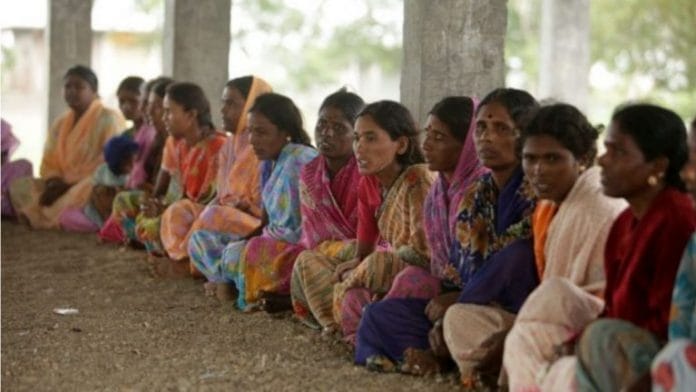New Delhi: More women in India faced mental distress and had fewer meals than men, especially in containment zones, as a result of the Covid-19 pandemic that caused stinging economic distress to households across the globe.
Forced to stay indoors for a large part of last year while economic activities took a hit, women suffered significant damage to their well being during the lockdowns, noted a study published earlier this week in the National Bureau of Economic Research, a US based nonprofit organisation that publishes academic research.
Compared to the pre-pandemic situation, 76 per cent of households reported a decrease in their individual income and 24 per cent reported a decrease in meals for someone in their household, it further noted.
The study is broadly based on a telephonic survey conducted in August 2020 when India was recording about 40,000-50,000 cases daily, and covered 1,545 rural households in 20 districts. The districts were located across six states — Uttar Pradesh, Bihar, Jharkhand, Madhya Pradesh, Maharashtra and Rajasthan.
The households contacted were those already surveyed by IDInsights (IDI), a global advisory and research firm, in September-October of 2019, giving researchers a pre-pandemic reference point.
Also read: Social stigma towards mental health should not bother you in lockdown. Solution’s online
‘Women’s status in families makes them vulnerable’
The researchers conducted a 20-30 minute phone interview, which was divided into two parts. First was an interview of the household head, which was a man in 78 per cent of the cases, and second was an interview with a woman of the household, who would provide additional information about their well-being.
Through the survey, the study captured the changes in the nutrition and mental health of the women with respect to pre-pandemic times and the level of containment after lockdown began.
The researchers enquired about the food commodities mentioned in the National Family Health Survey-4 in order to compare the situation to before the pandemic. Since most respondents were vegetarians, the researchers focused their analysis on the consumption of milk, pulses, fruits and vegetables.
The authors found that compared to men, the likelihood of women having fewer meals was significantly higher in containment zones than in districts with no containment zones. Meanwhile, the change in men’s nutrition was statistically insignificant.
The study also showed that compared to areas not under lockdown, there was an overall 15 per cent chance of reduction in meals (fewer meals) in containment zones.
“When there are negative economic shocks to households, women are particularly vulnerable to declines in consumption,” they said in the study.
The authors said that this had to do with the status of women in their families.
Women were also asked about their emotional well being in which they had to describe if they were feeling sad or depressed, how often they couldn’t stop worrying and how much they worried about their physical safety.
The study showed that lockdowns increased the probability of women feeling sad, depressed and hopeless by 39-40 per cent, and feeling more worried than normal by 45 per cent.
It also established that women with daughters were more likely to face threats to their mental health. As one moves from a no-lockdown zone to a containment zone, women with daughters were 7 per cent more likely to feel more anxious, 10 per cent more likely to feel unsafe, which “may capture an increased threat of intimate partner violence”, the authors said.
Owing to the low vaccination rates in the country, the probability of another Covid wave and a subsequent lockdown cannot be ruled out, the study noted. In case a lockdown is introduced, the authors suggested that policymakers “target aid, particularly access to food, to vulnerable households and women”.
(Edited by Manasa Mohan)
Also read: 1 billion people are currently experiencing mental ill-health. Yet funding remains very low






